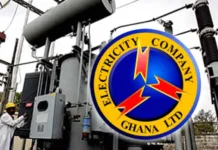
The government is changing its initiatives to involve the private sector in the operations of the Electricity Company of Ghana (ECG) as part of a reform aimed at stabilizing the energy sector’s finances and ensuring its long-term sustainability.
The Finance Minister Dr. Mohammed Amin Adam emphasized the urgency of these reforms during the recent IMF/World Bank meetings, stating that the annual $1.2 billion debit in the energy sector is “not acceptable.”
“Funds that should be allocated to essential services like healthcare and education are being diverted to cover losses in a sector that should ideally attract market-based solutions.”
As part of the financial restructuring, the government is introducing the “cash waterfall” mechanism to ensure that ECG’s revenue is distributed equitably throughout the energy value chain.
Dr. Adam stressed the importance of restoring investor confidence, noting that “people have lost trust in our ability to manage the energy sector due to financial problems.” The government is also in the process of renegotiating power purchase agreements with Independent Power Producers (IPPs) to alleviate its debt burden.
Recent negotiations with IPPs, including Sunon Asogli, which faced a shutdown of its 560MW plant due to a $259 million payment dispute, indicate some progress, though challenges persist. Dr. Adam assured that the shutdown has not impacted the power supply. “If one plant shuts down and the others continue to operate, it simply means that we have enough to supply our people.”
New agreements have already been signed with Cenit and AKSA, two of the six IPPs involved in the restructuring consultations, and these do not require parliamentary approval, ensuring smoother operational continuity.
However, negotiations with Sunon Asogli have encountered difficulties, as the government rejected the company’s request for an additional $30 million in payment. Dr. Adam explained, “While we initially agreed to a one-time payment of $30 million, Sunon Asogli later requested another $30 million, which was not included in our settlement terms.” He emphasized that no funds will be disbursed until an agreement is finalized.
Other IPPs, such as Karpowership, are also in discussions with the government, but their recent request for an extra $70 million was turned down by Dr. Adam, who restated the government’s commitment to responsible fiscal management. “We must negotiate and finalize agreements before any payments are made. Ghana is not just any country,” he stated.
Pending agreements with Cenpower and Amandi Energy requires parliamentary approval, and Dr. Adam urged Parliament to reconvene to approve these essential reforms. “This is one of the impacts of the suspension on government operations, as we were counting on Parliament to ratify these renegotiated agreements.”
Through these reforms, the government aims to rebuild trust, stabilize the sector, and ensure that Ghana’s energy infrastructure can meet its long-term objectives.
Source : Ghana/Starrfm.com.gh/103.5/ Jasmine Adjei Anyetei



